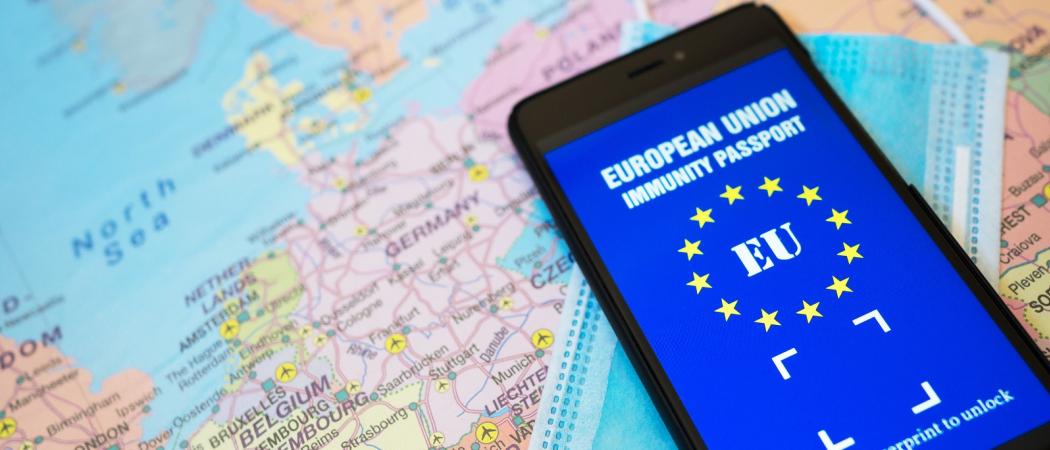A Swedish start-up has a ‘virus certification app’ ready to launch but it faces practical and ethical hurdles. ‘The government is not in our supporter club on this’, says Coronafree’s science adviser

Start-ups in Europe are racing to build digital immunity passports for COVID-19, but the adviser behind one Swedish project admits the idea is contested.
The passports would link a person’s identity to a coronavirus antibody test result, so they can share this immune status with third parties like employers, airports or restaurants.
The passports, or certificates, would re-establish trust and re-open economies faster, argues Gunnar Klein, professor of eHealth at Örebro University School of Business, who is scientific adviser to Coronafree, the winning project in the Swedish government’s ‘Hack the Crisis’ competition in April.
“Many people see it as a great idea, though it’s not uncontested by experts,” said Klein, an immunologist. “The government in Sweden is not in our supporter club but there are other experts, companies and private care organisations that have embraced our concept.”
Digital immunity passports are one of three data-driven lockdown escape routes under investigation by governments, alongside symptom tracking applications and digital contact tracing.
Tech firms are in talks with ministers around Europe about how digital certificates can be rolled out.
Fintech company TransferWise is helping to build immunity passports that are now being tested in Estonia. Other companies working on immunity passports include the UK start-ups Onfido and Yoti, and Germany’s IDNow.
The US government is reportedly in talks with Onfido to develop biometric immunity certification technology.
In China, two QR-enabled health status apps – one developed by Ant Financial, a sister company of Alibaba, and a rival application developed by TenCent, are being used by local authorities, employers, cafes and restaurants.
Coronafree applied for an EU research grant in March but was rejected. “We asked for €1.5 million,” said Klein. “But the evaluators wanted evidence it would be sustainable long term. If we have a full immunisation programme around the world, we may not need something like this in the long-run.”
Undeterred, the group has registered a non-profit company. With funding, Klein reckons the app could be ready to launch with two weeks’ work.
“We felt an urgency in March to do this and in our view the concept becomes more and more relevant the longer the pandemic continues,” said Klein. “Maybe we’ll have to wait until September or October, or until around 50 per cent of populations have had the disease.”
“Is it going to fly? Even though we won the hackathon, [the prize] was peanuts, €1,500. We are in discussion with a government body and private investors to get more realistic sums.”
Objections
But there are still plenty of question marks over digital corona-certificates. “I think the main objections are: can we trust the antibody tests and is there the risk that people with antibodies will still be contagious to others?” Klein said.
While it is thought anyone infected with COVID-19 will develop at least short-term immunity from re-infection, no one knows how robust that immunity is. Most tests are not sophisticated enough to reveal the extent of a person’s immunity, or for how long it will last. And even the best performing tests still return a number of false positives.
“Based on antibody studies in SARS [also a coronavirus] it is possible that immunity will only last about one to two years, though this is not yet known for certain, and we do not know how good blood antibody levels are in predicting immunity for COVID-19,” said Paul Hunter, professor in medicine at the University of East Anglia.
Passports are “political inventions built around complex scientific concepts,” said James Naismith, professor in structural biology at Oxford University. “Only a safe and effective vaccine, that I believe will come in the future, will deliver widespread immunity from infection.”
Looking at a recent mass study of how many people in the UK have antibodies against the virus, professor of immunology at Imperial College London Daniel Altmann says, “Based on these results only a tiny minority of the population could obtain an antibody passport.”
Data collected so far “encompasses a range of antibody levels, some of which might confer protection, some not, meaning that an antibody passport might not be a marker of future protection,” Altmann said.
Some worry that immunity passports would also stigmatise groups of people. The passports would create certain privileges for people who’ve contracted COVID-19 and may even encourage people to catch the disease, in the hopes of returning to work quicker.
A recent report by London-based artificial intelligence research group the Ada Lovelace Institute, warned that immunity passports “pose extremely high risks in terms of social cohesion, discrimination, exclusion and vulnerability.”
“It could make life more difficult for people who are not immune, was the argument I read,” said Klein. “But the certificate is a way of ensuring that those people who have struggled to survive the illness are not prevented from doing things or going places. That’s ethical.”





 A unique international forum for public research organisations and companies to connect their external engagement with strategic interests around their R&D system.
A unique international forum for public research organisations and companies to connect their external engagement with strategic interests around their R&D system.